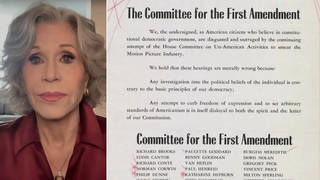
Pittsburgh community organizer Summer Lee was elected the first Black woman to represent Pennsylvania in Congress after winning the state’s 12th Congressional District in Tuesday’s midterm elections. Lee, currently a state representative, faced off against Republican Mike Doyle — who happened to share the same name as the outgoing Democratic incumbent. We speak with Aimee Allison, president and founder of She the People, who explains how Lee successfully fended off a massive negative ad campaign funded by the pro-Israel lobbying group AIPAC. Allison also speaks about the mayoral race in Los Angeles, where progressive Karen Bass is in a tight race with billionaire Rick Caruso, as well as other races where strong progressive candidates fell short. “The heartbreaking loss of some of the nation’s best candidates demonstrates that the Democrats need to invest early and very, very strongly in these excellent candidates in order to protect and build up their capacity to turn out the votes,” says Allison.
Transcript
AMY GOODMAN: This is Democracy Now!, democracynow.org, The War and Peace Report. I’m Amy Goodman, with Juan González.
On Tuesday night in Pittsburgh, Pennsylvania, state Representative Summer Lee, a member of the Democratic Socialists of America who ran on the Democratic ticket, won her race to replace retiring Democratic Congressmember Mike Doyle. The race confused many voters because Summer Lee’s Republican opponent has the same name as the Democratic congressman who’s retiring: Mike Doyle. In fact, one of his last ads was “a name you can trust,” and he rarely identified himself as Republican. Summer Lee also faced a flood of opposition and funding from AIPAC, millions of dollars put in against her. This is Summer Lee addressing supporters Tuesday night.
REP. SUMMER LEE: It looks like — it looks like we won an election here. … We believed in you all, because when we were up against a wall, every single time when it looked like it was getting bleak, we had friends come from all over. When we got into the name confusion and people started wondering what’s going on, we had friends come up. When AIPAC dropped another million dollars in the last week just to send a message and just to try to demoralize us, our movement didn’t sit down. We stood up, and we fought back and sent this message that we’re not going to be intimidated, that we are not going to be told what we can and cannot do. We’re not going to let dark money and outside folks come into Western Pennsylvania and tell us what type of representation that we deserve, because our communities have been waiting far, far too long for this. So, this is victory not just for me; this is victory for each and every one of us.
AMY GOODMAN: That’s Summer Lee speaking at her victory party Tuesday night in Pittsburgh as she becomes the congressmember-elect for Pennsylvania, the first African American congresswoman to represent Pennsylvania. Meanwhile, in Illinois, state Rep. Delia Ramirez made history as the first Midwestern Latina elected to the U.S. Congress.
For more on these and other races, we’re joined in Oakland, California, by Aimee Allison, president and founder of She the People.
It’s great to have you back with us after we had a late night with you on our midnight — special.
AIMEE ALLISON: Thank you.
AMY GOODMAN: Talk first about Summer Lee.
AIMEE ALLISON: Well, you know, what we should know about Summer Lee is, first and foremost, she’s a movement organizer. She comes out of the Black Lives Matter movement. And when she ran years ago for state legislature, she displaced a moderate white guy Dem who wasn’t serving Pittsburgh, in an environment in Pennsylvania where the Black and Brown vote hadn’t been fully utilized and engaged in order to build power. Well, she set about doing just that. And she faced stiff opposition. As she mentioned in her speech last night, among those who ran ads and tried to derail her, both in the primary and in the general, AIPAC’s last-minute ads attacking her attempted to demoralize and silence her. But her organizing skills really came through. And what’s really interesting about Summer Lee, who is unabashedly an advocate for gender justice, she talked about housing, she talked about reproductive justice, she talked about criminal justice reform, and she didn’t back away from any of those things, leaned into it, organized her set of voters and had a victory.
And, you know, the thing is, people are looking at the statewide victory of Fetterman, senator-elect, and they’re saying, “Wow! That’s surprising.” But it isn’t, when we think about there was a surge in early voting of women in Pennsylvania, a lot of that fueled by organizers and local elected officials like Helen Gym, who’s on the Philadelphia City Council. Statewide, we were seeing that the ability to turn out women and most of the Democrats in that state — a large percentage are women of color who are Democratic Party loyalists, really progressive voters. So, that capacity to be able to turn out voters in Pittsburgh that the Congresswoman-elect Summer Lee demonstrated, I think, when the dust settles, will show to have contributed to the statewide Senate win and the possibilities for Democrats to govern more effectively in this next phase. Very excited about her and the leadership that she’s going to demonstrate even as a freshman congresswoman in Washington, D.C.
JUAN GONZÁLEZ: And could you talk to us also about other key races that you were following that you think are bellwethers? And also, if you could talk about the race, the municipal race in Los Angeles, that has national ramifications, Karen Bass, the progressive there running for mayor of Los Angeles, but it’s a very tight race there?
AIMEE ALLISON: It is a tight race. You would think in a state like California, who has a reputation for being a solid blue Democratic stronghold, that a former Republican and a person who had fueled and funded so many Republicans in his past would be in this tight race with Karen Bass, who, you know, was the former head of the Congressional Black Caucus, was a very well-known housing activist locally in Los Angeles and is widely respected. But the fact of the matter is you’ve got Caruso, who, you know, is a billionaire and spent, so far, at last count, $150 million of his own money to buy up the airwaves in the nation’s number one media market to attempt to buy the election. Meanwhile, Karen Bass, who is the candidate who speaks to working people’s concerns, particularly around housing in Los Angeles, has made her case. But it is a tough race. And the bellwether there is: Are we going to see, in a state like California, a billionaire, who can claim and change his party registration or has tried to wear some different political stripes at the last minute to be able to claim the seat — Los Angeles is a very wealthy and very, very important local municipality in this country, so the bellwether is that.
I’m also looking at another California race. Malia Cohen was the seventh Black woman to serve in an executive office. She won controller in California. California is the fourth-largest economy in the world, and she writes the checks. This is significant because she bested a Republican who was not committed to choice in the way that California will be funding clinics, as a place where women from surrounding states will go to have reproductive services. So, this is a very, very important race, as well.
And then, turning toward Ohio now, Ohio is very significant. And many Democrats have thought, you know, Ohio is increasingly red. Tim Ryan had a surprisingly competitive race there, and I heard people saying, “Well, you know, why was that?” And you can look no further than the congressional race in Akron, Ohio 13, Emilia Sykes, who ran and won and beat a Trump-endorsed candidate who during the campaign was standing with Trump just a dozen miles from Akron in that very famous scene where many of the supporters were throwing up, you know, kind of “Heil Hitler”-type hand gestures. She was there and running in that district, and millions of dollars of dark money in racist and sexist ads fueled by Kevin McCarthy’s PAC attacked Emilia Sykes, attempted to weaken her. But what Emilia Sykes was able to do in the state was to gather the multiracial group of voters and succeed in Akron, and now she is congresswoman-elect. And now that the majority of the House is down to a few select races, our eye needs to be fixed on important races like in Akron, where Emilia Sykes just succeeded. The thing we need to learn right now is that Ohio and other battleground states are not just — the future is not just Republican, that there are strong campaigns happening in the middle. And actually, Emilia Sykes will make all three of the congressional representatives from Ohio Black women. And that’s significant in and of itself.
JUAN GONZÁLEZ: And could you talk about some women of color who fell short and the lessons to be learned from last night’s votes — Stacey Abrams, Cheri Beasley? We have about 30 seconds.
AIMEE ALLISON: The heartbreaking loss of some of the nation’s best candidates — Stacey Abrams, Val Demings in North Carolina, who fell short on her Senate bid, and others — demonstrate that the Democrats, who — need to invest early and very, very strongly in these excellent candidates in order to protect and build up their capacity to turn out the votes, particularly in a midterm year. The lesson learned is, for ’24, invest early in the candidates who will inspire the Democratic base, women of color, so that we can be successful next time around.
AMY GOODMAN: Well, Aimee Allison, we want to thank you for being with us, president and founder of She the People. You can visit democracynow.org to watch our three-hour election night special last night. Democracy Now! wants to also thank our executive director Julie Crosby, who worked behind the scenes to make this all happen. We want to thank Renée Feltz and Mike Burke and Deena Guzder, Messiah Rhodes, Nermeen Shaikh, María Taracena, Tami Woronoff, Charina Nadura, Sam Alcoff, Tey-Marie Astudillo. I’m Amy Goodman, with Juan González. Stay safe.












Media Options